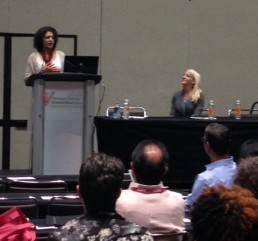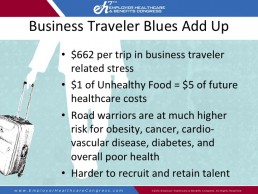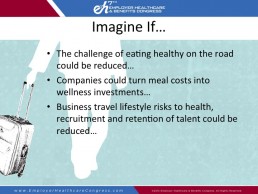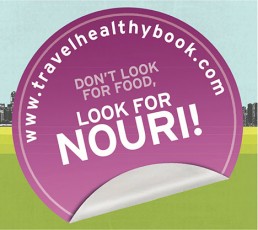






It was a great honor not only present at The Employer Healthcare & Benefits Congress in Orlando, Florida this week, but to present alongside the extraordinary and inspirational Julie Wilkes, North American Wellness and Disability Lead at Accenture. The Employer Healthcare & Benefits Congress was the largest gathering of Corporate Wellness professionals–nearly 3000 professionals including HR, Benefits, Corporate Wellness, Medical Tourism, and International Luxury Hotel providers. There were nearly 150 exhibitors showcasing fitness, nutrition, benefits and other wellness solutions.
As I introduced myself, the book, GBTWA (Global Business Travel Wellness Associates) and the concept of travel wellness to most of the exhibitors, the reaction was along the lines of “yes, it is so hard to eat healthy while traveling; we struggled to find something decent to eat here in Orlando; business travelers are indeed being left behind” and so on.
While business travel as a necessary evil seems to be accepted, the notion of travel wellness is new territory for many HR and corporate wellness professionals. Travel wellness is the recognition that business travelers are different from non-traveling employees. While corporate wellness programs tend to focus on promoting general healthy lifestyle choices, they generally don’t specifically address the unique environment of business travelers—the regular aircraft, car, train, hotel, and restaurant environment that change the dynamics and negatively impact the business traveler if not properly managed.
Julie and I invited the audience to think differently about business travelers. While I explained the unique business traveler environment, the hidden costs associated with business travel, especially the hidden healthcare costs of companies subsidizing unhealthy eating choices, Julie discussed how Accenture is supporting its 300,000 + employees across 120 countries, most of whom travel weekly to client sites. Frequent travel as we all know puts an enormous stress on our bodies and our families. Accenture has rolled out online gym, brain health, and telephonic wellness coaching programs, along with mobile nutrition apps that provide recommendations to support frequent travelers. In addition, when it comes to primary care givers, Accenture has taken the bold move to not only increase paid primary care giver leave, but also to allow new moms to work locally for up to one year without any adverse career implications. For traveling moms, Accenture has also instituted a program that ships breast milk back home to baby.
If healthcare cost savings is the name of the game in corporate wellness, then a closer look at corporate business travel is needed. Corporate wellness is a $2 billion industry; corporate dining is a $12 billion industry, and corporate travel is a $305 billion industry. Meals account for 21% of corporate travel expenses, and 30% of the daily per diem. If we really want to scale corporate wellness within organizations, especially organizations with a large number of business travelers, we need to start coordinating corporate wellness with those departments that control travel budgets and implement travel expense policies.
This will require a major culture shift in many companies. Creating a Culture of Health requires Leadership, Tools, and Reinforcing Signals. Creating a Corporate Travel Culture of Healthy Eating will require a little more; and that starts with a new word for food.
Most people don’t know what to eat anymore, let alone what is “healthy” to eat due to all the marketing jargon around healthy eating and wellness, and most importantly because the food supply has become so
adulterated with chemicals, genetic modification, and processing. The new word to describe what we should be eating for optimum health is nouri. I explained the power and responsibility that comes with a little word change. Nouri is simply defined as food that is not chemically treated, not genetically modified, not processed (even whole foods go through some amount of processing or packaging to be distributed, we really mean any processing is very minimal, and does not include chemical additives, or synthetic substitutes) that boosts the immune system, increases energy, improves cellular function… and, and, and reduces the risk of the illness and disease. That is a lot of responsibility in a little word. Adopting this word is a mind shift, which will lead to culture shift.
Get inspired: Julie also owns and operates a yoga studio, is a life coach, and is author of The 7 Life Miracles. Julie kicked off our presentation with a little fitness and breathing activity to get the circulation moving. Julie surprised everyone with her closing recommendation on how to kickstart this culture of health and corporate travel culture of healthy eating… it all starts with kindness.
Wellness is about kindness to ourselves and kindness to others. Start by doing one kind thing for someone today.